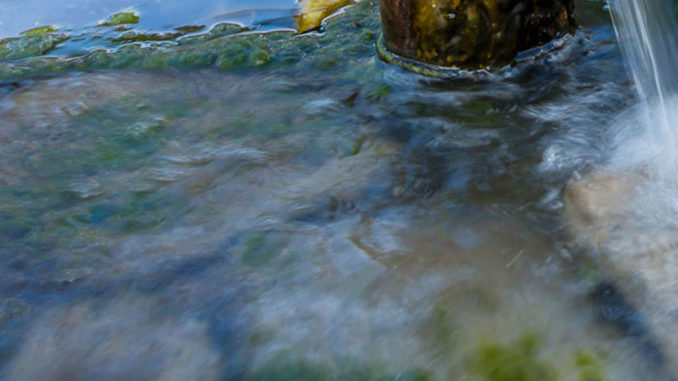
Recent explosion that rocked Abule-Ado, a suburb of Lagos, has rekindled concerns over pollution of groundwater in some communities in the state. There is mounting apprehension that the water sources of the affected communities are polluted and nothing is being done to redress the ugly situation and save lives. Especially now that COVID-19 pandemic has taken the steam out of that critical need.
The explosion has added to the rising incidents of contamination of water supply sources from pipeline and fuel underground storage tanks that residents of some communities have been battling with.
The Abule-Ado explosion reportedly affected 170 buildings, displaced 276 persons and led to the death of 20 people. Billions of naira worth of property were destroyed. The impact of the explosion on groundwater is not yet determined but it has reawakened public consciousness on the issue of contamination of the water supply source.
For example, the Baruwa community in Alimosho Local Government council has for years been battling with environmental pollution caused by oil spillage from petroleum pipeline that runs through the community from Mosimi oil depot and Ejigbo oil facility.
The residents have attributed the problem to the wrong location of petroleum infrastructure, saying the spillage is capable of wiping out communities in the affected areas if not checked.
The people regret that despite outcries on the effect of the spillage on their lives and environment, which they say often, results in breathing and respiratory disorder, the authorities have done nothing significant to alleviate their problem.
More pathetic is the case of residents of Akoka in Bariga local council, where over 600 residents in the community have been battling with fuel from Total filling station in the area. This is a product emanating from its underground tank that pollutes water sources in the area.
According to reports, the most affected are residents of St. Finbarr’s College Road and adjoining streets, namely Abdullahi, Aiyetoro, Oyenuga, Wulemotu Ajoke, Itesiwaju, Shobande and Sholanke streets.
Among the vulnerable persons are 155 infants, young persons under the age of 17 and quite a number of elderly persons between the ages of 66 and 90.
Besides, hundreds of school children constantly quench their thirst with the contaminated water from the public tap in the community on their way to and from school. Evidently, the residents have sent a save-our-souls (SOS) letter to the governor on what they called a systematic and gradual poisoning of their community by Total Plc.
They are requesting clean potable water, medical evaluation, screening and treatment of the residents as a result of the pollution as well as the exhumation of the 49-year Under Storage Tanks at the Total Filling Station and possible relocation of the station far away from the residential area.
According to the residents, they became aware of the presence of PMS in their water from 2017 when the source of the calamity was traced to the Total filling station along St. Finbarr’s Road, adding that the smell oozed from the tap water in their homes and community in general.
The foregoing might just be the tip of the iceberg. With the frequent pipeline explosions all around Lagos, there is no doubt that many communities are suffering from unmitigated pollution of their water sources. Sadly enough, in most of the cases, there is no official investigation to determine the level of pollution and exposure by people.
Not long ago, Vice President Yemi Osinbajo lamented the high death rate of children from unsafe drinking water, which underscores the failure of governance in most parts of the country.
The Vice President revealed this oddity at the unveiling of the National Water Policies and launching of the Partnership for Expanded Water Supply, Sanitation and Hygiene (PEWASH), organised by the Federal Ministry of Water Resources in Abuja.
That common potable water, a basic necessity of life, is still lacking in Nigeria that has reaped stupendous wealth from oil is an indictment on the country’s leadership at all levels. It is a matter of high regret. There is no doubt that access to clean drinking water is critical to people’s personal well-being and the welfare of our communities. The COVID 19 pandemic has shown that the intersection of water and public health is more relevant than ever.
Health officials are frequently advising everyone to adhere to basic hygiene practices like regular hand washing and ensuring all surfaces in the home and workplace are regularly cleaned and disinfected to protect themselves and others from contracting Coronavirus. This requires a constant and dependable flow of clean water to every home and place of work. Those on essential services (utility operators), have stayed on the job to ensure that drinking water and wastewater reclamation plants are working to provide clean water to communities.
Furthermore, over the years, the World Health Organisation (WHO), African Development Bank (AfDB), UNICEF, among other national and multilateral agencies, have partnered with the federal and state governments in an effort to provide potable water in the country and yet access to clean water remains dire. Billions purportedly expended have been unaccounted for. Corruption and lack of continuity marred the efforts.
It is high time that the authorities took the issue of water provision serious to avoid plunging communities into another epidemic that would compound the ravaging COVID-19 pandemic. A statewide evaluation of groundwater to determine the level of pollution is now imperative with a view to mitigating the problem.
END

Be the first to comment